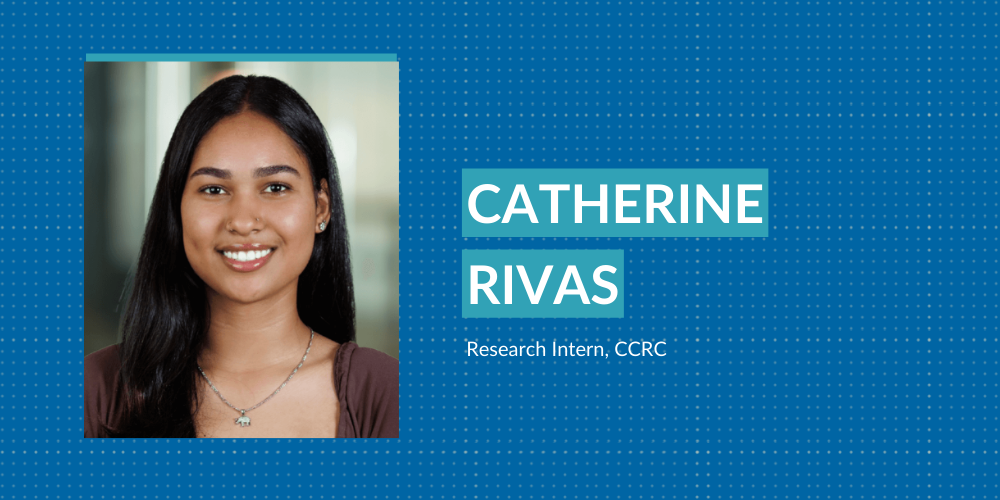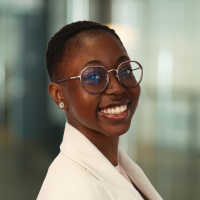Catherine Rivas is a rising senior in the BA/MA program at The City College of New York (CCNY), majoring in psychology with a concentration in research. She’s joined the CCRC team for the summer as a research intern contributing to two projects: one researching practices community colleges are using to shrink equity gaps and another examining the support networks of first-generation college students. In this Q&A, Rivas delves deeper into her own college experience and her motivations for research.
This Q&A has been condensed and edited for clarity.
Deenika Oladipo: Tell me about yourself.
Catherine Rivas: I was originally a student at SUNY Potsdam. I was a biology major with a psychology minor. I was there up until my second year, during which I decided that I needed a little break. I felt like I didn’t know which direction I was going in or which path to take. Biology just wasn’t a major that I truly liked or enjoyed. It felt kind of dreadful to take the courses, and I wasn’t enjoying the learning. I wasn’t really enjoying any of it. A part of it could have been because it was during COVID. With so many restrictions on campus, everything was kind of out of place already.
Oladipo: How did you end up at City College?
Rivas: Back in high school, I had taken an intro to psychology course. I enjoyed that class so much, and I remember just how much I participated, how many questions I asked, and how engaged I felt with what the professor was teaching. It wasn’t until I decided to take a break from school when I asked myself, Why don’t I just make this my major? I took a semester off before starting my career at CCNY just so that I could figure some things out in my life. Once I started at CCNY, everything kind of started aligning for me. I declared my psychology major, and now I’m in the BA/MA program with a concentration in research. I would say that that transition was due to the support system that I developed at CCNY that guided me towards that pathway.
Oladipo: What motivated you to work at CCRC for the summer?
Rivas: My decision is tied to my passion for psychology and wanting to help people. Working at the academic advising office at CCNY gave me the opportunity to be in on the staff meetings with the academic advisors. My input is valued since I’m a student and I get to see the impacts they have on students. When I learned about CCRC and the work they do, it really resonated with my passions, my goals, and it built a bridge between my role at the academic advising office and my ambitions for helping others on a broader scale.
Oladipo: How has your life influenced your perspective on higher education?
Rivas: I think that it’s had a significant influence on the way I view college. It’s like the saying, “College isn’t for everyone.” It’s designed for a specific group of people. When I was at SUNY Potsdam, I didn’t feel represented in their student body. But now there are initiatives that are pushing for equity and inclusivity. I realized that it’s not that college isn’t for everyone; it’s just that different institutions have different systems in place, and maybe those systems sometimes just don’t benefit you.
Oladipo: What are you currently working on here at CCRC?
Rivas: For the Complete College America project, the goal is to understand how community colleges are trying to minimize equity gaps within their student populations. Currently, the team has chosen the colleges that we’re going to focus on to do the interviews, and now we’re moving on to the next steps. I’m helping conduct website scans, where we compile data from the college websites about the resources they have available for students. I’ve also been interviewing college personnel at the chosen schools about this as well. I’ve been given the opportunity to help work on the brief outline for the Crimsonbridge project, which is all about the support networks of first-generation college students who weren’t able to complete their studies. The brief will be published in a couple of months, I’m assuming, so that’ll be nice.
Oladipo: What do you hope to learn before the end of your internship?
Rivas: Given this is my first time being a part of the writing process in a brief, I want to further develop my writing skills for research purposes. I’m not the biggest fan of public speaking, so I want to also become more vocal about my thoughts and my opinions. We do have a lot of meetings. I would like to learn how to say, “Oh, I have an idea about this,” rather than just keeping them to myself.
Oladipo: What are some current and longer term career goals you have?
Rivas: One of my current goals is to hone in on what I want to do in the future. I’ve been thinking about how I can possibly incorporate higher education research with clinical psych or maybe even counseling psych. I want to pursue clinical psychology, and I know that I want to pursue research as well, and interning at CCRC has given me the chance to explore the research aspect. It’s definitely been a very eye-opening experience in allowing me to see that this could be a potential career path for me.





